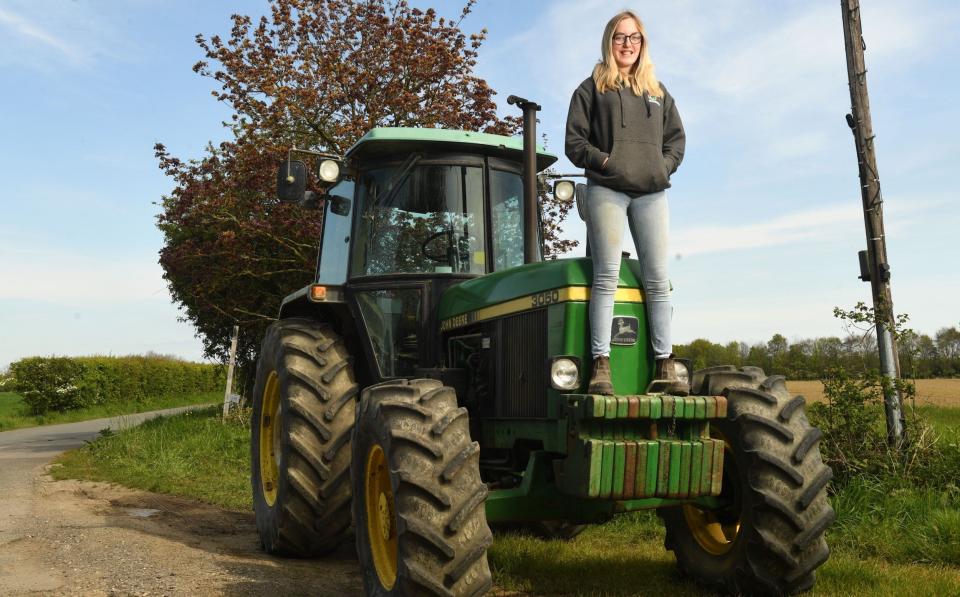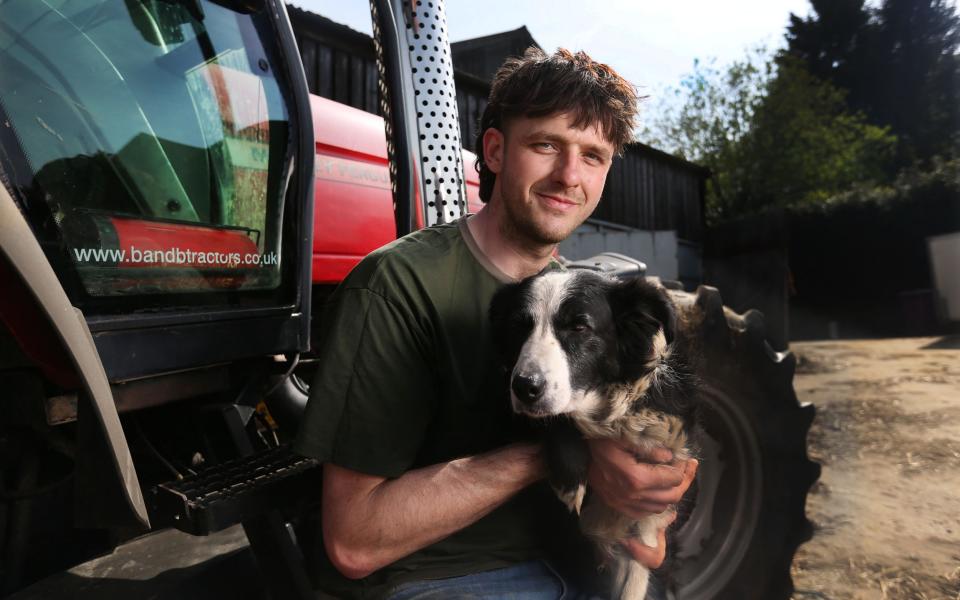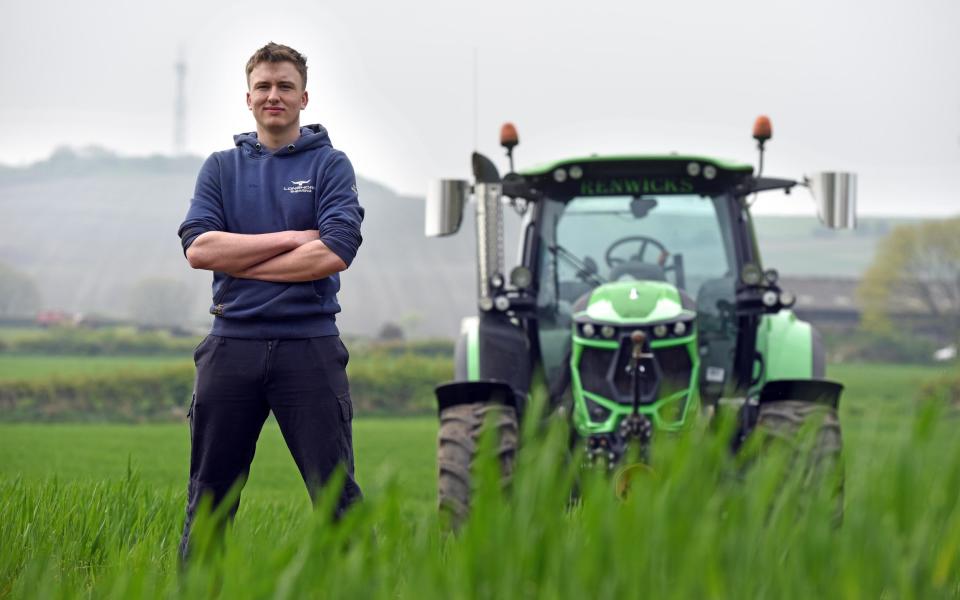‘I get paid £12 an hour and drive a £300k tractor’

Charles Ward has been riding tractors since his feet could barely reach the pedals. “I got into farming as soon as I could waddle,” he says. “Every day I’d come back from school and start seeing to the cows, or sit on my dad’s knee in the tractor.”
Now 27, Ward is a fully fledged farmer in his own right but still works on his parents’ farm in Derbyshire, which has been in his family for some 200 years.
“There’s no wage or salary – you’re investing into a family business, so you’re never drawing a salary out of it.”
Despite dedicated families like Ward’s, Britain’s once-proud farming heritage is in a state of worrying decline.

The numbers are already bleak: last year, the overall number of agricultural workers fell by 1.7pc to 462,000, according to the Department for Environment, Food and Rural Affairs (Defra). There are some 10,000 fewer agricultural workers than there were in 2018.
Meanwhile, farms are under greater pressure than ever before. Defra’s most recent report into the state of agriculture in the UK found that one in 10 farms were making a net loss, while 40pc averaged a farm business income – equal to net profit – of just £50,000.
Ward, who also works as a stonemason to bring in extra income, is acutely aware of the volatile nature of the industry. His own farm has also had to diversify into an ad-hoc butcher’s shop to bring in more money.
‘Not enough youngsters want it’
Britain’s agricultural sector has for generations relied on children taking on family businesses, but as labour becomes more difficult to import post-Brexit, the industry is at great pains to lure in new domestic talent from outside of farming families.
Since 2017, apprenticeships have emerged as a popular route – not least because they do not saddle farmers with student loan debt.
Figures published by the Institute for Apprenticeships and Technical Education show that around 6,500 young people have opted for agriculture-related apprenticeships every year for the last five years, bar a brief dip over the pandemic.
“There are young people getting involved, but they’d rather work with machinery in the arable sector so there’s a shortage of people working with livestock,” says Ward.
“I have a friend on a dairy farm and they’re crying out for staff all the time – they have to import foreign labour because not enough youngsters want it.”
Farming is a lonely career path: the work is exhausting, the days start early and finish late, and much of the time is spent alone. “The weather gives you such a small window – you literally have to make hay when the sun shines,” says Ward.
“I do make time to enjoy myself but I don’t have holidays.”
Jeremy Clarkson’s Amazon Prime series Clarkson’s Farm has brought a fresh wave of attention to the plight of Britain’s farmers, from spiralling costs to the rise of Nimbyism. But a fairer picture of what young farmers’ lives are like emerges more clearly on TikTok, where users document their day-to-day lives for audiences of thousands.
“I’ve met people from all over the country through TikTok,” says Ward, who has 20,000 followers and whose most-viewed video has half a million views. He has opted not to monetise videos or accept sponsorship money, but has had a few free clothes thrown his way.
‘It’s a lonely job’
It was Grace Charnley’s boyfriend Toby who inspired her to get into farming by suggesting she do shifts on a dairy farm in Hampshire. “I did all the milking and calf-rearing, and I learned to drive a tractor,” she says.
Charnley, 21, had already attended an agricultural college where she specialised in equine care before deciding she would prefer the arable sector.
“It’s quite a big thing for a woman [in this industry] to be allowed that opportunity to sit in a £250,000 piece of equipment with a £50,000 bit of machinery trailing behind,” she says of her work now.
“I’m not from a farming family and I don’t have those connections.”
For Gen Z-ers like Charnley, who earns about £12 an hour, farming offers the kind of day-to-day fulfilment that the corporate grind simply never will. “The sense of achievement is what keeps me in it,” says Charnley. “It’s a lonely job and you have to put your graft in – more so than anything else.”
Young farmers’ groups have cropped up across the country to stop the career becoming too isolating. This weekend, most will be travelling to Blackpool for the annual ‘DIY AGM’ – a long weekend of nights out that serves as the industry’s unofficial freshers’ week.

Jamie Renwick, 18, is currently in the middle of his level 3 agricultural extended course, dividing his time between the farm he works at near Gateshead and studying.
“Because of where I grew up I didn’t interact with lots of farmers, so I missed out on the young farmers’ clubs,” he says. “But I enjoy the serenity of being by myself.”
Now, though, Renwick is getting stuck in. “I’ve been to a few of the dos and it’s a great way to meet people,” he says. “You end up talking to people about their farming life and how they are struggling – you see that it’s not just you.”
Like Charles Ward, Renwick documents his exploits on TikTok, and has cultivated a side-hustle selling tractor stickers. “I really enjoy making videos and it’s something I want to push more.”
But Renwick’s first love will always be farming. He says: “At the minute I am not getting paid, but as soon as I finish college I’ll be straight at it – hopefully for the rest of my life.”

 Yahoo Finance
Yahoo Finance 